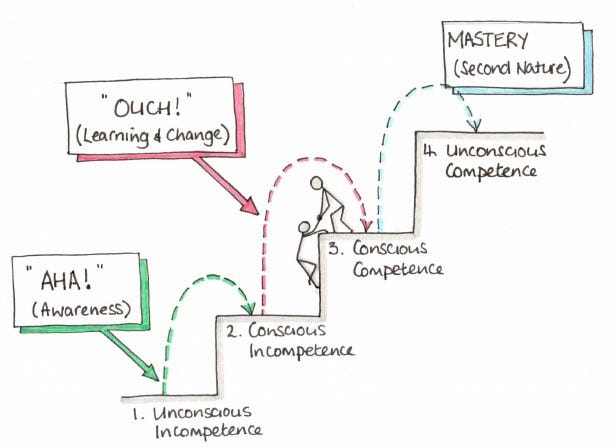When it comes to changing and improving, the first step is awareness. Therefore, feedback is a gift.
The 4 Stages of Competence
In 1969, management trainer Martin Broadwell first described the below mental model as "the four levels of teaching." The model became popular through the 1970s as business leadership & management training proliferated the concept and has become part of culture to this day.
The four stages of competence are seen in psychology as the stages involved in the process of progressing from incompetence to competence in a continuum.
The model suggests that people are initially unaware of their incompetency, but as they are able to recognize their incompetence, they’ll consciously be able to improve them.
Eventually, their competence can be utilized without it being consciously thought through.
Practical Skill Acquisition & Coaching
(1) Creating awareness of a skill or tactic.
The first step to purposefully getting better is taking in information and becoming aware. People who have desire to improve have a desire for information that makes their deficiencies known to them. From there they can work on them.
People and organizations that truly want to improve and sustain high standards crave information. This information illuminates the unconscious incompetency and starts the process of improvement.
These people appreciate external information from trustworthy sources. They understand that other people are quicker to understand deficiencies, known as blind spots. Once these blind spots are known, the journey to internalize them and improve begins.
There is a reason why meditation is a powerful tool used around the world. Meditation creates awareness in many ways and assists in internalizing things. Meditation is simply the act of thinking about thinking and bringing awareness to thoughts.
Related: The Importance Of Journaling
(2) Progressing the skill/tactic into the unconscious
Once we are more aware, it’s time to sink that improved area into our unconsciousness so we can focus on another area. In skills coaching, we call this the “automation stage.”
Getting Through the Uncomfortable Stage
What often happens is that people are uncomfortable going through the stages. Very few are able to accept the process naturally and push through all of the stages. Rather, people focus on how the process feels. The four stages can be broken into three stages of feeling - ‘Aha!’, ‘Ouch’, and ‘Mastery’. This is what the experience is to each individual.
In 1993, Jurassic Park became a massively successful film (was the top-grossing film of all time until Titanic in 1997) with a massively memorable scene about how “Nobody cares.”
It’s a scene that’s often turned into a meme when someone cares more than they should about something, just like Dodgson.
Understanding that there will be some growing pains and accepting them is a part of the learning process. No one is going to become a master overnight.
Creating Awareness
Accepting feedback is a great habit. It provides awareness and information that can spring personal growth.
From a hockey standpoint, I know I’m not the only coach that often has to show players that there are plays to be made in the defensive zone aside from “glass and out.” At first, it’s difficult, and there are turnovers and goals against. As they climb the ladder, they start to understand progressions and how to process speed, and there is an immense level of confidence built as mastery is built.
Accept feedback
Think: where should my focus be?
Awareness first. Everything else follows.
P.S. By subscribing to the Hockey IQ newsletter, you’ve already started to gain more awareness and are well on your way to mastery.
Further Reading
Did you enjoy this newsletter?
Help us spread the ideas within and share it with the people you care about






